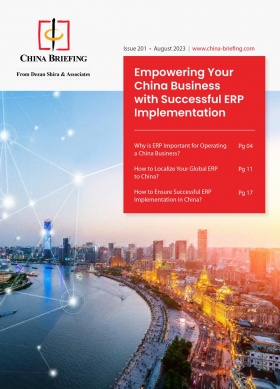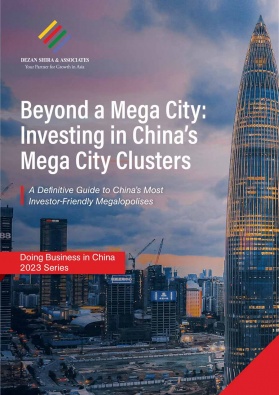China’s New Rules for Private Funds: Implications for Chinese and Foreign Fund Managers
China’s new Private Fund Regulations came into effect on September 1, 2023, which provide clearer administrative measures aimed at deterring violations by private fund managers. Increased regulatory control is anticipated to enhance financial stability in China and support the healthy growth of the country’s real economy. However, the outlook is still murky for foreign investors.
On July 9, 2023, China released the “Regulations on the Oversight and Management of Privately-Offered Investment Funds”《私募投资基金监督管理条例》, hereinafter referred to as “the Private Fund Regulations”), aimed at enhancing investor protection and fostering innovation in the nation’s Private Fund domain.
The Private Fund Regulations came into effect on September 1 and are designed to govern a sector valued at RMB 21 trillion (US$2.9 trillion) in 2023. This piece offers a summary of the principal clauses within the Private Fund Regulations and their potential consequences.
What is the rationale for the Private Fund Regulations?
The private fund sector has played a constructive role in serving China’s economy, fostering innovation, and addressing individuals’ wealth management needs. The Private Fund Regulations mark Premier Li Qiang’s endeavor to harness the considerable potential of private funds—previously an underregulated realm—to stimulate growth and broaden funding avenues.
Before the introduction of the Private Fund Regulations, the “The Interim Measures for the Supervision and Administration of Private Investment Funds (《私募投资基金监督管理暂行办法》),” released by the China Securities Regulatory Commission (CSRC) in 2014, served as the primary framework for overseeing the private funds market. However, given its relatively lower legislative status as a departmental regulation issued by industry regulators, in contrast to the Private Fund Regulations issued by the State Council, and the rapid advancements within the industry over the past decade, it has become evident that the Interim Measures are no longer adequate. The need for the Private Fund Regulations arose to enhance the legislative structure in China for better management of private funds and to propel the industry toward high-quality development.
The updated Private Fund Regulations impose stricter criteria on private fund managers, their shareholders, and controlling entities. The core objective of the Private Fund Regulations is to bolster financial stability by managing sources of risk and to optimize the operation of private funds in promoting the real economy. Furthermore, the Private Fund Regulations set clear regulatory boundaries, strengthen oversight, and employ tailored supervision, particularly for venture capital funds.
How to read China’s Private Fund Regulations: Key points
With 62 provisions in seven chapters, the Private Fund Regulations apply broadly to various forms of private investment funds, including contract, company, and partnership. They encompass fund manager and custodian responsibilities, fundraising, risk assessment, venture capital oversight, overall supervision, management, and service agencies. In contrast to the existing regulations, the Private Fund Regulations provide clearer administrative measures aimed at deterring violations by private fund managers. The key concepts are outlined below.
Enhancing investor protection and promoting industry standards
The Private Fund Regulations prioritize safeguarding investor rights, upholding market integrity, and fostering fair practices. Privately offered fund participants, including managers, custodians, and service providers, must uphold voluntariness, fairness, and integrity (Article 3). This mandates compliance with investment-level regulations for managers. The Private Fund Regulations also bolster employee requirements, prohibiting actions that harm investors or disrupt financial order (Article 6). Moreover, fund managers must establish a system for managing affiliated transactions, ensuring information disclosure and proper decision-making (Article 10). This aims to ensure transparent affiliated transactions and compliance with disclosure norms.
To separate privately offered fund assets from managers’ and custodians’ holdings, the Private Fund Regulations assert the independence of fund property. Except where the law dictates otherwise, debts tied to privately offered fund assets are solely the responsibility of the fund property itself (Article 16). This provision shields investors from the financial positions of managers and custodians, safeguarding their investments.
Differentiated supervision and administration
Acknowledging the varied nature of privately offered funds, the Private Fund Regulations introduce a customized approach to oversight: The CSRC will apply distinct supervision based on factors like business models, assets under management, compliance status, and risk management, and implement categorized supervision on diverse private fund types, encompassing private equity, venture capital, and securities investment funds (Article 6, Article 33). This bespoke strategy ensures more efficient regulation, tailoring oversight to the unique attributes of different privately offered fund categories, such as venture capital, equity, and securities investment.
Requirements for fund managers and custodians
The Private Fund Regulations outline rigorous mandates for privately offered fund managers and custodians in Chapter 2. The managers must be legally established as corporations or partnerships, and verified by registration and record-filing authorities. Additionally, individuals or entities aspiring to hold roles like shareholders, actual controllers, or general partners of fund managers must satisfy specific qualifications, including sound financial standing and adherence to stipulated mandates set by the securities regulatory body.
Furthermore, fund managers are obliged to appoint seasoned executives with relevant expertise in investment management, risk oversight, and compliance, fostering investor-centric priorities and strong governance. Raising funds is restricted to qualified investors meeting predetermined asset or income criteria.
Monitoring and enforcement
To ensure market stability and safeguard investor interests, the Private Fund Regulations introduce a comprehensive monitoring mechanism for privately offered funds (Article 23). This system enables centralized oversight of fund operations and investor holdings. The State Council’s securities regulatory authority will supervise this monitoring process, taking necessary actions to enforce compliance with the Private Fund Regulations’ provisions. The regulator retains the authority to shut down operations, replace directors and senior executives, and mandate third-party audits if fund managers engage in activities detrimental to fund operations and investor interests, as outlined in the new rules (Article 34).
Various infractions, including improper fund property use, non-public information disclosure, and non-compliance with regulations, could result in fines, warnings, or suspension of business operations.
Foreign-invested fund managers and cross-border fundraising
Of great significance, the Private Fund Regulations state that administrative guidelines for foreign-invested private fund managers will be separately formulated by the CSRC and relevant State Council departments, aligning with foreign investment rules (Article 61). This suggests the possibility of new regulations tailored to foreign-invested private fund managers.
Articles 61(2) and (3) state that foreign institutions generally cannot directly raise funds from domestic investors to establish private funds, unless exceptions are specified by the State. Private fund managers conducting fund activities overseas must adhere to pertinent State regulations.
While the extent of these exceptions remains unclear, it is widely presumed to encompass rules linked to programs enabling foreign asset managers to secure capital from domestic Chinese investors for overseas investments, such as QDII (Qualified Domestic Institutional Investors), QDLP (Qualified Domestic Limited Partners), and QDIE (Qualified Domestic Investment Enterprise).
Nonetheless, global asset managers must be cautious when considering fundraising from domestic Chinese investors (via cross-border models), ensuring it does not misconstrue as regulated activities within China.
An open question is whether the prohibition on domestic investor fundraising extends to these investors’ foreign entities and vehicles. The Private Fund Regulations’ release might necessitate further interpretation by China’s regulatory bodies.
China’s rapidly growing private fund market
By May 2023, approximately 22,000 private investment managers had registered with the Asset Management Association of China (AMAC), overseeing roughly RMB 21 trillion (US$2.9 trillion) across 153,000 funds. The growth of China’s Private Fund industry has been fueled by capital market reforms, notably the expansion of the onshore stock markets, which have surged over the past decade to a value exceeding US$10 trillion.
However, this year, Chinese private funds have experienced a higher rate of license revocations compared to 2022. The AMAC data reveals that between January and July, there were 2,035 private fund deregistration—a twofold increase from the same period last year. These irregularities encompass issues like incorrect or incomplete information disclosure and prolonged periods without managing fund products. Many in the industry consider the removal of licenses from certain poorly managed funds as a positive step toward the healthy evolution of China’s capital market.
Further, the Private Fund Regulations come as China’s economy faces mounting downward pressures, including weakening global demand, increasing geopolitical risks, and uneven economic recovery across sectors. Increased regulatory control is anticipated to enhance protection for fund holders and mitigate potential risks that could disrupt the nation’s financial system.
What do the Private Fund Regulations signify to the public and foreign investors in China?
In general, the Private Fund Regulations have garnered industry approval. Many view that the Private Fund Regulations provide an official recognition that underscores the private fund industry’s growing significance in driving economic and technological advancement. It signifies an elevated status for a sector that once operated in a relatively undefined and partially unregulated space. Moreover, the Private Fund Regulations will enhance financial stability in China by effectively mitigating sources of risk and optimizing the functioning of private funds to support the growth of the real economy.
At the same time, the Private Fund Regulations may present a murky outlook for foreign investors. The majority of the existing framework applicable to foreign-invested onshore fund managers is expected to remain in place, possibly being incorporated into future regulations. However, uncertainties still exist regarding any potential additional requirements that foreign-invested fund managers might face under the forthcoming special rules. We will closely monitor these developments and provide updates as they unfold.
About Us
China Briefing is written and produced by Dezan Shira & Associates. The practice assists foreign investors into China and has done so since 1992 through offices in Beijing, Tianjin, Dalian, Qingdao, Shanghai, Hangzhou, Ningbo, Suzhou, Guangzhou, Dongguan, Zhongshan, Shenzhen, and Hong Kong. Please contact the firm for assistance in China at china@dezshira.com.
Dezan Shira & Associates has offices in Vietnam, Indonesia, Singapore, United States, Germany, Italy, India, Dubai (UAE), and Russia, in addition to our trade research facilities along the Belt & Road Initiative. We also have partner firms assisting foreign investors in The Philippines, Malaysia, Thailand, Bangladesh.
- Previous Article Qualifying for China’s Pre-Tax Super Deduction for R&D Expenses – A Case Study Review
- Next Article Hong Kong’s Data Center Sector: Industry and Regulatory Landscape







